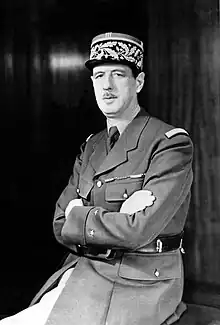Gaullism
Gaullism (French: Gaullisme) is a French political term of people who support the ideas and presidency of World War II French Resistance leader General Charles de Gaulle.

Charles de Gaulle in his general's uniform ca. 1942.
Gaullism cannot be seen within a political ideology, meaning it is not left or right. It is more of how the President of France should use their power.
"Neo-Gaullism" has been used to describe a movement after the death of de Gaulle in 1970 from people who are economic liberal than both traditional and social Gaullism.[1][2]
Gaullist political parties
The following is a list of Gaullist political parties and their successors:
- 1947–1955: Rally of the French People (RPF)
- 1955–1958: National Centre of Social Republicans (CNRS)
- 1958–1962: Union for the New Republic (UNR) and Democratic Union of Labour (UDT)
- 1962–1967: Union for the New Republic – Democratic Union of Labour (UNR – UDT)
- 1967–1968: Democratic Union for the Fifth Republic (UD-Ve)
- 1968–1971: Union for the Defence of the Republic (UDR)
- 1971–1976: Union of Democrats for the Republic (UDR)
- 1976–2002: Rally for the Republic (RPR)
- 1994-2018: Movement for France (MPF)
- 1999–2014: Debout la République (DLR)
- 2002–2015: Union for a Popular Movement (UMP)
- 2014–present: Debout la France (DLF)
- 2015–present: The Republicans (LR)
References
This article is issued from Wikipedia. The text is licensed under Creative Commons - Attribution - Sharealike. Additional terms may apply for the media files.